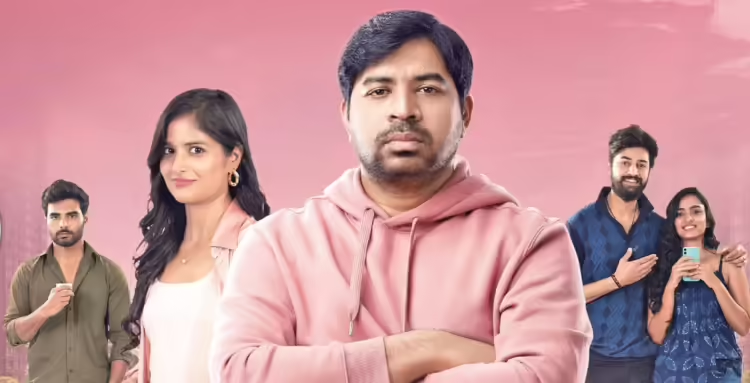Review of the film “My Dear Donga”: A character-driven comedy-drama that is both charming and dry
Underdog protagonists are a prevalent theme in movies. A few weeks ago, we had great pleasure in Sachin’s foolish efforts to find love and purpose in life in Premalu. These personalities often have something positive about them. Their peculiarities make them unique. Their journey gets more intriguing the more flawed they are.

The main character in My Dear Donga, Sujatha (Shalini Kondepudi), is not a member of such group. She is only a typical young lady. Despite her tendency to often breach the fourth wall with her inner monologues, she has almost come to terms with being the second fiddle in her own life. Her normalcy is made even more noticeable by the fact that she spends a significant amount of the initial part of the story playing second fiddle to other individuals. In the opening moments of the movie, whether Sujatha discovers her lover Vishal deceiving her, or when her closest friend Bujji (Divya Sripada) receives a proposal, there is no denying that look. We don’t first see Sujatha as herself until we see her sitting in front of a television, crying in her own living room while listening to a song from a Mani Ratnam film. The tragedy of Sujatha shines through throughout all the well-timed humor, and Shalini Kondepudi convincingly portrays this stereotypically uninteresting Jane with nothing going for her.
Thus, major changes in Sujatha’s life occur when she receives a very unexpected visit on her birthday from a small-time crook called Suresh (Abhinav Gomatam). Suresh turns out to be an essential part of her life. Sujatha is an emotionally unstable copywriter.
Short, conversational stories are what make My Dear Donga fresh. During a remarkable moment, Sujatha and Suresh connect over their shared experience of coping with a distant father figure. Their conversation progresses to a point where they start to question if their father is still the same. Suresh exhales in relief as they both say different names at once. As soon as they realize they too have something to be thankful for, despite their deeply scarred pasts, the tragedy quickly transforms into comedy.
It doesn’t take long to navigate a movie like My Dear Donga, which is a gentle coming-of-age tale in which our lead character Sujatha ultimately assumes the lead role in her own life following an absurdly fortuitous encounter with a stranger. This is in contrast to the film’s many scenes of frenzied energy. Sadly, the movie never quite manages to strike the right balance between poignancy and humor.
We know where things are headed, therefore My Dear Donga shocks us by choosing not to go for a conventionally positive conclusion. Shalini’s decision to end the story this way is a bold one. When Sujatha starts to feel a little more stability in her life, the scenes become less humorous and more focused on emotional resolves. Sujatha and the audience both lose interest in the humor. We can only be thankful that Sujatha has changed into a new person now that we know this. Once again, however, it’s not a simple transition to go from warmth to humor, and My Dear Donga stumbles miserably in its attempt to strike the correct chord. We can’t decide whether to accept the film’s kindness or be turned off by its flimsy staging. Though intriguing at first, the fourth wall breaching becomes cliched after a while.
Shalini Kondepudi, who is also the film’s writer, puts her all into making this movie succeed, while other sections fall short of expectations. A better director was required for My Dear Donga. While there are plenty of jokes that really hit home, there are just as many that elicit no laughs at all. Furthermore, I’m not usually bothered by a movie’s modest production value, but My Dear Donga’s two distant vistas and dimly lit frames really got under my skin. Sujatha’s dimly lit face at a pivotal confrontational moment in the last act really confused me. How is it possible for us to get emotionally invested in a story when we are always looking for the protagonist’s face? (Here, Shalini deserves special recognition for her honest and unvarnished depiction of Sujatha, which manages to keep us interested).
Director B SSarwagna Kumar follows the script’s goals, conveying the mundane discomfort of real-life interactions, when he is not hindered by his technical constraints or his difficulties to establish the proper tone. The characters who fill Sujatha’s life, Bujji, Varun, and Vishal, are not overtly humorous relief figures. They have just enough of an ordinary quality to elicit empathy from us, but they also have a humorous hint of self-delusion. There is no artificial dance when Sujatha and her pals start dancing informally at a home party. Nobody is making a fervent effort to pull the house down. Everybody has a different energy when they dance, and it’s this incongruity of energy that speaks. Another time, two recently introduced pals clumsily discuss the weather of the day before becoming too analytical for their own good and thinking back to the previous day’s temperature. While it’s awkward for everyone around them, it’s a wonderful time of bonding for the two, and the filmmaker skillfully portrays their compassion without sacrificing humor.
My Dear Donga is at her most endearing in these carefree times. Furthermore, even if there are many issues with My Dear Donga, it still has enough warmth that it is difficult to ignore the book as a whole.







